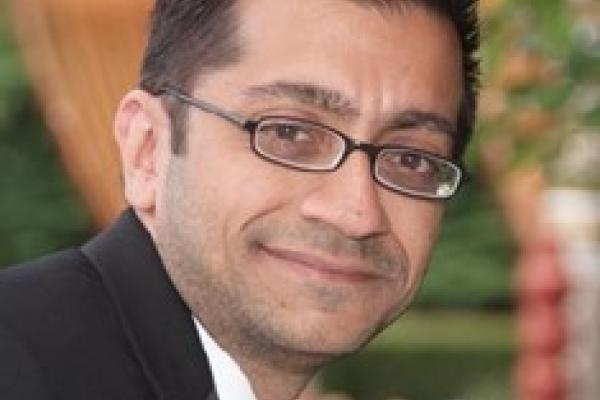In Memoriam – Sanjay K. Chugh

Professor Sanjay K. Chugh passed away on December 13, 2022. It is with great sadness that the Department of Economics bids farewell to our esteemed colleague.
Sanjay joined Ohio State in 2016 as an associate professor, while also taking up the reins as a lead editor for the Journal of Money, Credit, and Banking. Prior to his arrival here, he had held academic positions at Boston College and the University of Maryland, following his early research career at the Federal Reserve Board after receiving his Ph.D. from the University of Pennsylvania in 2004.
Though his research agenda spanned several areas in quantitative macroeconomics, Sanjay was renowned for his contributions to the studies of optimal monetary and fiscal policy and labor markets, and the ways that they interact. There, he revisited well-known solutions to Ramsey optimal policy problems facing governments seeking to maximize the welfare of households whose own choices are influenced by government policy, deriving optimal policy in theoretical economies featuring empirically relevant departures from the frictionless Walrasian markets characterizing prior studies. Across a series of productive collaborations, his meticulous analysis uncovered important, original insights into both the robustness of the principles guiding optimal policy and the fragility of the policy prescriptions themselves. For example, when labor markets involve search frictions, wage taxes should not be constant over the business cycle, as widely understood before his 2012 Journal of Political Economy paper with David Arseneau. Instead, a welfare-maximizing government should work to stabilize labor market distortions by setting cyclically varying taxes; thus, we learn the presence of realistic frictions alters the implementation of Ramsey policy while its purpose remains the same, stabilizing distortions in response to aggregate shocks.
Colleagues and students at Ohio State remember Sanjay fondly for the earnestness, intellectual curiosity and humility he brought to our seminars and macro group meetings, which carried over into his role at the JMCB and in his teaching and advising. However, his touch extended well beyond our department through a rich network of colleagues, coauthors and students. Many among them affectionately recall his passion for economics, his clarity of thought and communication, and his ability to bring joy and friendship into the research process. Jesús Fernández-Villaverde reflects on Sanjay as his first graduate student at Penn in the early 2000s and as his contemporary on their last meeting here in December 2019, saying he was “always full of energy and with great new ideas. I probably learned more from him than he did from me.” Noting with pride the important insights and contributions to macroeconomics left by Sanjay’s academic career, he laments: “I will always wonder about the many excellent papers he could have written.” Dirk Krueger, who also advised Sanjay at Penn, says: “He taught me much about economics, through his papers, his book and through his editorial work at the JMCB. I am profoundly saddened that he is no longer with us, but his legacy and impact on those who knew him, professionally and privately, will live on.”
David Arsenau began coauthoring with Sanjay soon after they arrived as colleagues at the Federal Reserve Board. Describing their collaboration on “Tax Smoothing in Frictional Labor Markets” (2012 JPE), he recalls: “We worked very hard - running simulations and doing derivations on scrap paper - but also spent a good deal of time talking about things completely unrelated to work or economics. Those were some of the best times in my professional career.” Borağan Aruoba knew Sanjay as a fellow graduate student at Penn and again later as a colleague and coauthor at the University of Maryland; he likewise reflects: “We had long and numerous conversations about baseball, Ramsey optimal policy, and everything in between. He was curious, caring and generous. I miss him!” Alan Finkelstein Shapiro, who overlapped briefly with Sanjay as a graduate student at Maryland and later began collaborating with him, says: “He was the best coauthor one could hope for, and he had a very big positive impact on his students, myself included.”
Sanjay similarly affected those who came to know him at Boston College. Long-time friend and colleague Fabio Ghironi recalls: “we spent countless hours together, working on our paper, but also talking about many other topics - economics, the functioning of our profession, our lives, sports, food. I loved our conversations.” Ryan Chahrour reflects on Sanjay’s generosity with graduate students, success in motivating undergraduate students and the labor of love that was his advanced undergraduate textbook, Modern Macroeconomics (2015, MIT Press). Speaking as coauthor and friend, he adds: “I will miss his incredible optimism, energy, and curiosity about economics. Late night pizza and deep discussions with Sanjay about Table 12, panel b were early highlights of my career.” Susanto Basu remembers Sanjay as “an enthusiastic and energetic colleague and a valued member of the macro group,” noting the many students he advised who now have flourishing academic careers. He surely speaks for us all in this: “We will miss his optimistic outlook on life, his generosity to students and colleagues, and his scholarly insights.”
Sanjay Chugh will not soon be forgotten. He was a dedicated teacher to students of all levels, a valued colleague and collaborator, and a beloved family member. He is survived by his mother, his brother Ravi, and his adoring nephews Seya and Aadhi. Flowers and condolences may be sent to Ravi Chugh, 5825 S Dorchester Ave, Apt. 6W, Chicago, IL 60637.
